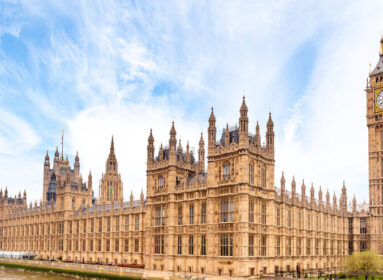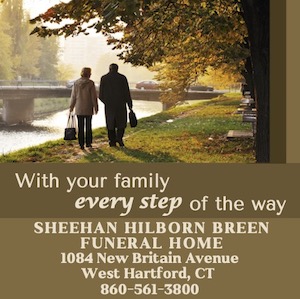By Cindy Mindell ~
Ron Hoffberg is the only Conservative rabbi in Prague, a position he has held for 11 years. The Chicago native’s rabbinical career started off typically enough: after receiving his ordination from the Jewish Theological Seminary in New York, he served as regional director of youth activities for United Synagogue of America in the Philadelphia area, then, as the longtime spiritual leader of Temple Beth-El in Cranford, N.J. He taught for more than two decades at the Solomon Schechter Day School of Essex and Union County, N.J. and was founder and director of Rabbinical Assembly New Jersey Region Institute, as well as regional president of the Rabbinical Assembly.
In 2001, after years visiting Jewish communities throughout the world, he began serving the Masorti Olami (World Conservative) community of Prague, first for a week, then for a year; now 11 and counting. He is also professor of Jewish history in the overseas studies program at Charles University in that city, and is a tour guide specializing in Jewish Prague and the other Jewish communities throughout central Europe.
Hoffberg will share his experiences as scholar-in-residence at Beth Hillel Synagogue in Bloomfield on May 4-5. Recently, he spoke with the Ledger about what American Jews need to know about their brothers and sisters in Europe.
Q: It seems as if many American Jews have a blind spot when it comes to the modern-day Jewish communities of Europe. Why is this?
A: When I was in Hebrew school a long time ago, we were all taught that the Eastern European communities had been destroyed – everybody had died in the Holocaust, and it was a horrible, terrible, antisemitic place that killed Jews. So why would anybody go there?
The older Jewish generation was raised with the ashes of the war and nothing else. Our grandparents’ generation left, so it couldn’t have been good and wonderful – but it was wonderful for 1,000 years; like the U.S., there were bad times and good times, or we wouldn’t have stayed there so long. It’s hard for us to think outside the box.
Most American Jews, unless they came from either a German or Austrian background – which is not the majority – hold a vision of Europe that is not central Europe but Eastern Europe, which is primarily shtetls and pogroms. But that was not central Europe.
Q: What was the Jewish experience in central Europe?
A: There was prejudice, and Jews had to wear special clothing during various periods, but a Jew could do business and be the richest person in town. It’s a whole different understanding of what nearly 1,100 years of glorious Jewish life in Europe was like. I often tell my tourists about Prague that we can give them a list of the pogroms, the 10 terrible days in Czech Jewish history.
But if you only have one per 100 years, that’s not so bad.
We always talk about the worst times in history; in the U.S., we focus on 9/11, but America wasn’t and isn’t only about 9/11.
When the Austro-Hungarian Empire was created, Jews were made the property of the emperor. They would give the emperor taxes and in return, the law of the land protected them. The Jew is the golden goose: he does business during the day, and goes into the ghetto and is protected at night. At that time, it was good for Jews to be property; it was the best situation in Europe, and made Jewish life in Prague during the 1500s a golden age. Why does a little Polish rabbi who doesn’t speak the language walk from Lodz to live in Prague? That was the Maharal, Rabbi Judah Loew ben Bezalel, a leading Talmudic scholar and Jewish mystic. Prague was the best place in the world for Jews if you wanted to live a Jewish life.
Q: What misconceptions do you encounter regarding the Jewish communities of Europe?
A: Nobody expects there to be a Jewish community in Eastern Europe post-Holocaust or post-Communism. We’ve learned over time that this one survived because they never told anybody they were Jewish; that one survived because they jumped into a barrel and were never discovered. There’s nobody in the Prague Jewish community who doesn’t have a story, because you have to have survived somehow. The Czech Jews have come through a process of discovering their Judaism, and some never knew they were Jews.
The American Jewish community is so tied up with Israel. That’s not a negative statement; it’s wonderful. Israel is in our focus because it’s in the news every day and many of us have a relative or friend living there and that’s our connection to outside the U.S. and we’re concerned about Israel so when we hear things in the news, it bothers us.
Q: What would you like American Jews to understand about Jewish life in Europe?
A: I do a lot of guiding in the Czech Republic and the question I’m most often asked is, why would Jews live here? They would live there because that’s the place they were born; that’s the food they know, the language they know, the culture they know. Jews don’t have many places around the world where they feel comfortable, and if they’re born into a Jewish community, they’re generally interested in living there.
There was a period of time when we didn’t understand that, and American Jews thought, how could any place that’s been Communist be livable today? A lot of those places have a high standard of living and it’s not a problem: they caught up. The week after Communism was gone, McDonald’s was up on the street corner. The end of Communism offered a new economic opportunity for the whole world. Levis used to be a black-market item sold under the table. A month after Communism ended, they had a store on the main square in Prague. Those countries didn’t go through the process of deciding and trying different styles of government – they went right for capitalism.
Q: What is Jewish life like in Prague today?
A: Prague’s Jewish community is well-to-do as a whole, as the government returned as much as it could to the community. But it’s not Germany, which has created huge Jewish communities. There are 130,000 Jews in Berlin and the community is growing like crazy, because Germany has a reason to make it grow. But we’re growing. When I came 10 years ago, there were no baby-buggies outside the synagogue, because we had no babies, because we had no Jewish marriages, but now we do. We won’t be what we once were, but if you want that kind of Jewish community, go to New York’s Upper West Side or New Jersey or Connecticut. For some, there is enough Jewish life in Prague and they stay.
One-sixth of the community has made aliyah; Israel is around the corner. Younger people are moving there because they want to live in Jerusalem or on the beach in Tel Aviv. Israel is a great Jewish place to live.
For our younger people, the more we get them involved, the more likely they are to move to Israel. We’re part of the Jewish world and today the Jewish world is quite connected.
Q: What can American Jews do to help the Jewish communities of Europe rebuild?
A: Much of the Jewish tradition we have in the U.S. came from Europe, and the least we owe European Jewish communities is a hand rebuilding. If the shoe were on the other foot, if the American Jewish community had been decimated by some calamity, we would hope that Jews from other countries would reach out.
That’s one reason I felt it was important to go: I am what I am because Europe Judaism was so rich and full and people brought it here, so it’s payback time; I have to help them rebuild. Someone else opened a bagel bakery in Prague, with lox and cream cheese. The bagels that left 80 years ago were only boiled, not baked; they were called “poor man’s bread,” and we brought them back better. I hope I’m bringing what we’re able to do Jewishly back better, and I hope they’re able to make it their own. It won’t look like American Judaism because ours didn’t look like what was brought over from Europe.
I try to help along what will become local Judaism. It’s a challenge: I’m an older rabbi and it’s exciting pioneering work, but the problem is that it’s still European-style and there is no money. The chief rabbi is paid by the state so the communities have no concept of paying a rabbi. There is some support from Masorti Olami and the Jewish Agency for Israel. I raise my own salary and money for housing and programming by speaking across the U.S. and teaching Jewish history at Charles University in Prague and guiding when I can, so it’s all part of a very complicated mix of trying to keep the community operating.
Q: How might American Jews stay connected with those communities?
A: Coming to visit the community is a very important thing because generally the people who come are coming for the Holocaust memorials, not to see living Jews. When I take people around on a Friday and they tell me how beautiful Jewish life was, I invite them to Shabbat services so that people can see living Jews and they say, “We’re going to the opera.”
It’s also important for Europe to see that Jews are visiting these Jewish communities. Prague is secure, it’s not Poland, but Jews are visiting all of these places – these are places where it’s important that Jews aren’t abandoning the graves, synagogues, etc. That’s an important contribution American Jews can make.
I’m teaching in the overseas program at Charles University, so we have many European non-Jewish students coming to study in a place where they can have contact with Jews, so it’s important that the Jewish community is out there for them to see. Jewish life in Europe is not about people who are gone.
There are thousands of people coming on March of the Living and they come through Prague and don’t see a single Jew, but they hear terrible stories from 70 years ago. They should hear the miraculous stories of today, and that helps us understand who we are as American Jews. We have babies, and they’ll grow and be connected to Israel, and why not to the American Jewish community as well?
Somebody came to Prague to recruit employees for Jewish summer camps in the U.S. and asked me to guide him. I said, “Why not take teens from the Jewish community? We have a Czech Jewish student union and it would be so great for them.” The guy said he’d never thought about that. All the Jewish summer camps hire Czechs, Poles, Hungarians, etc. to work for the summer, but it never occurred to him to hire Jews.
He said, “Why is there a Jewish student organization at the university?” Why shouldn’t there be? It makes sense that there’s a Hillel at Oxford or Cambridge – why not in Moscow? Why not in Prague?
Rabbi Ron Hoffberg, scholar-in-residence, will present the history of the Jewish community of Prague, as well as personal experiences and encounters. His May 4-5 program will include “Golem of Prague: Legends and History;” “The Magic of Jewish Prague Yesterday and Today;” and “Oskar Schindler: Imperfect Czech Hero.” Info: (860) 242-5561








 Southern New England Jewish Ledger
Southern New England Jewish Ledger












